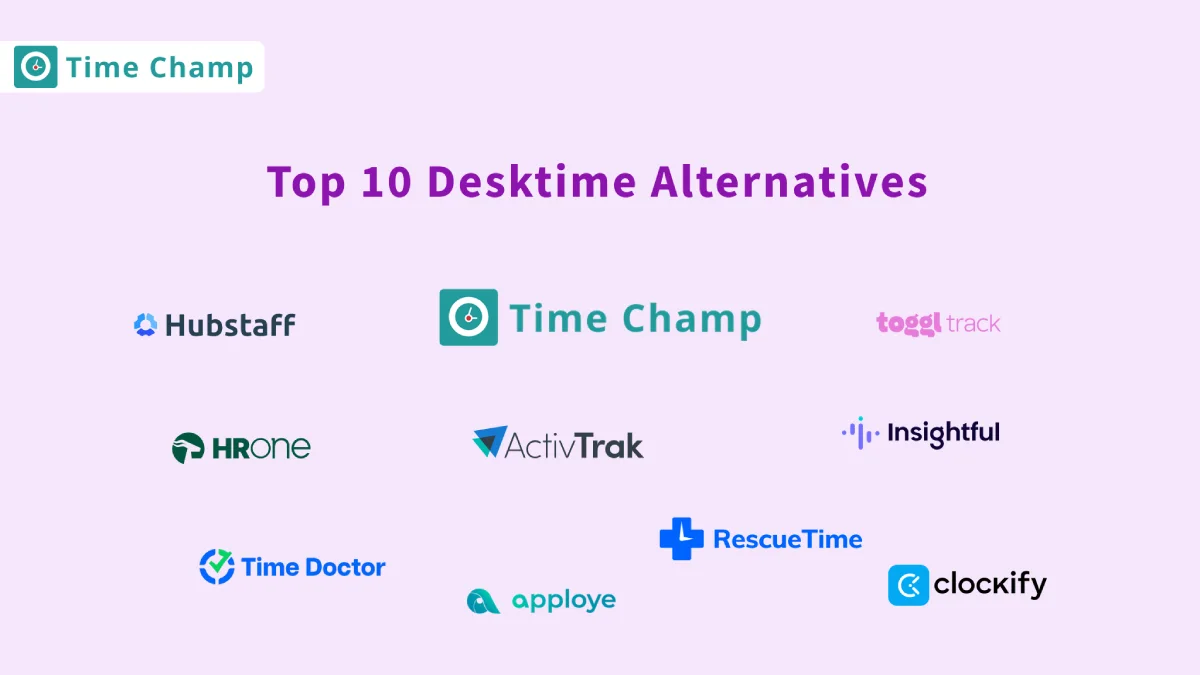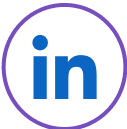We know well that time tracking is essential for managing remote and hybrid teams. While DeskTime helps streamline your teams, you’re stuck with rigid tracking, endless reports, and a team that feels more watched than supported.
Don’t worry, I’m here to help you get out of this situation. Every organization needs tools that builds trust, not tension. If DeskTime is no longer meeting your team's needs, it's time to switch to other tools. I have handpicked the top DeskTime alternatives that will help your team to be recognized and supported in their real productivity and work perfectly in remote and hybrid environments.
Why Many Teams Are Moving Away from DeskTime?
Many teams are moving away from DeskTime because it feels more like surveillance than support. It focuses on screenshots and tracking idle time as well as activity tracking through AI, which can negatively affect trust, particularly in remote or hybrid environments.
In addition to that, the platform is not flexible, it has a clunky interface, and it is focused on hours and not actual results. This results in the employers switching to more basic, AI-free solutions that do not micromanage their workforce but increase productivity instead.
Key Features of DeskTime
- Time tracking automatically logs the work hours, breaks, and idle time .
- Performance evaluation analyzes app usage and activity to measure productivity.
- Reporting provides summaries of work hours and about team performance .
- Scheduling helps to manage shifts, attendance, and availability.
- Screenshots capture screen images at a particular set of intervals during work hours.
- Integrations and APIs connect DeskTime with widely used platforms such as Asana and Trello.
- Customizable settings allow adjustments to tracking, privacy, and notifications.
Limitations of DeskTime
1. Overly Invasive Monitoring
According to the reports of many users, features such as automated screenshots and real-time tracking feel intrusive, particularly in remote work environments, which makes them uncomfortable and demoralizing to employees.
2. Lack of Context Behind Data
DeskTime focuses heavily on time spent and app usage but offers limited insight into the actual output or quality of work, which can lead to inaccurate productivity assessments.
3.Outdated and Unintuitive Interface
Some users stated that the dashboard is confusing and that the general design is not polished with modern UX, which makes it more difficult to get an insight into work or adjust the settings.
4. AI-Driven Tracking Can Be Distracting
Activity classification through AI, such as auto-categorizing tools as productive or unproductive, isn’t always accurate and can mislabel essential tools, causing frustration.
5. Very Basic Project Tracking
While DeskTime includes time allocation per project, users noted that it lacks depth in task management, timelines, or team collaboration compared to other tools.
6.Manual Logging
DeskTime does not provide automatic attendance tracking, employees need to log manually, which leads to buddy punching and inaccurate records.
7. No Built-In Communication Features
DeskTime lacks messaging, commenting, file sharing, and collaboration. Which is only possible with the help of other apps, which introduces friction in the daily work processes.
Best Alternatives to DeskTime for Smarter Work
Don't worry, as you have better alternatives to DeskTime as long as it is not serving your team well. These tools can simplify time monitoring, eliminate the stress factor, and become much more user-friendly.
| Software | Key Features | Pricing | Rating |
|---|---|---|---|
| Time Champ |
|
|
|
| Hubstaff |
|
|
|
| Toggl Track |
|
|
|
| Time Doctor |
|
|
|
| HROne |
|
|
|
| Clockify |
|
|
|
| RescueTime |
|
|
|
| Insightful |
|
|
|
| Apploye |
|
|
|
| ActivTrak |
|
|
|
1. Time Champ
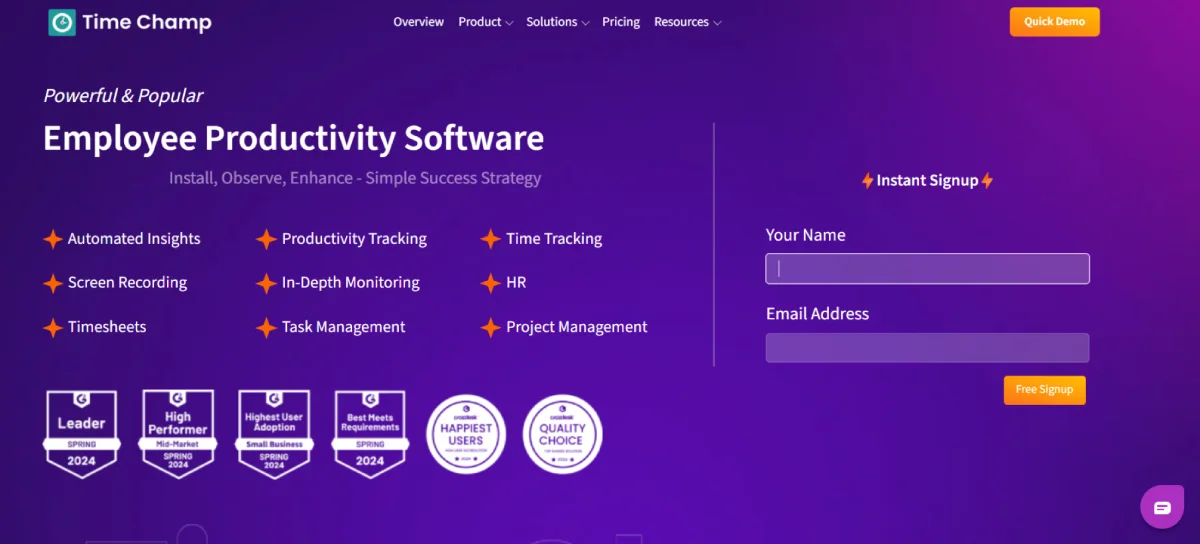
Time Champ is a powerful yet easy-to-use time tracking tool that helps teams stay focused without feeling micromanaged. It’s designed for remote, hybrid, and in-office teams who want clear insights, better productivity, and a healthier work culture - without the stress of constant monitoring.
Features of Time Champ
- Automatic time tracking records employee work hours in the background without needing manual input.
- Geofencing-based location tracking logs attendance based on physical location entry and exit, without any AI prediction or movement tracking.
- App and website monitoring tracks which apps and websites are used, without AI-based productivity scoring or intrusive analysis.
- Project and task tracking allows teams to log time against specific tasks for better visibility, with full control over what’s tracked.
- Real-time dashboard shows live activity data without using AI to interpret or evaluate employee behavior.
- Attendance and shift management helps monitor login times, breaks, and schedules - no AI-driven behavior detection involved.
- Customizable Settings let you choose what to track and how, ensuring privacy and flexibility with no hidden automation.
Pros & Cons
| Pros | Cons |
|---|---|
| Offers GPS and geofencing | May feel overwhelming with many features |
| Affordable pricing plans | Limited offline access |
| Accurate time and activity tracking | Mobile app could be smoother |
| Helps with payroll and attendance | Takes time to set up for large teams initially |
Pricing
- Starter: $3.9/User/Month
- Professional: $6.9/User/Month
- Enterprise: $13.9/User/Month
Ratings
- G2: 4.8
- Capterra: 4.9
2. Hubstaff
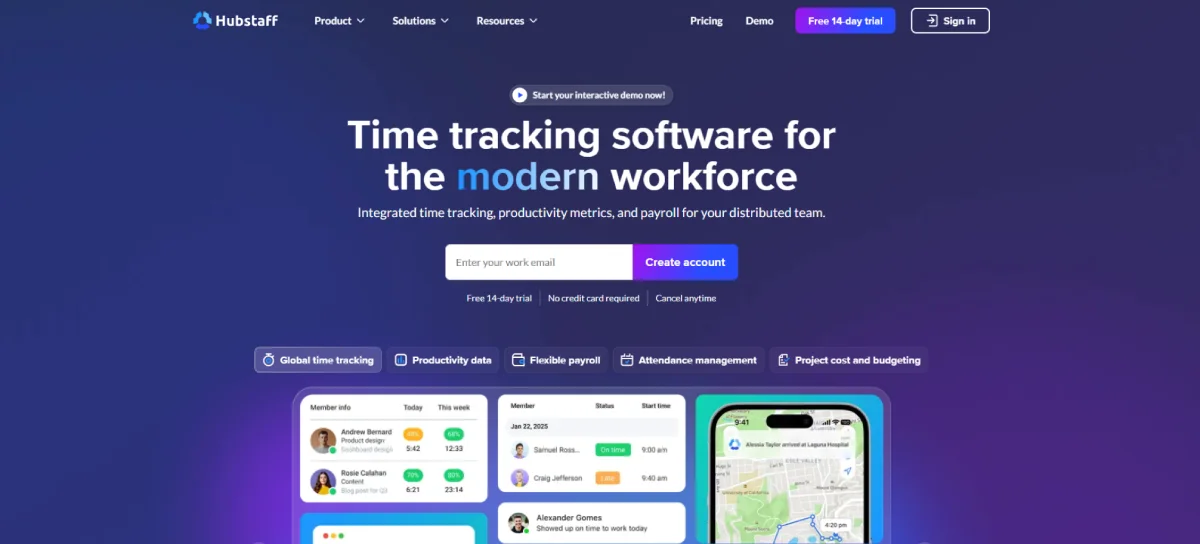
Hubstaff is a popular time tracking tool built for remote, hybrid, and field teams that need better visibility into how work gets done. It combines time tracking, productivity monitoring, GPS location tracking, and team management features, making it a strong choice for you if you want more structure and control over daily operations.
Features of Hubstaff
- Time tracking records work hours automatically or manually.
- GPS location tracking logs real-time locations for mobile or field teams.
- Timesheets show daily and weekly overviews of recorded work hours.
- Project and task tracking assigns time to specific tasks for better clarity.
- Idle time detection alerts users when no activity is detected.
- Screenshots capture screens at set intervals with full user control.
Pros & Cons
| Pros | Cons |
|---|---|
| Easy to use and beginner-friendly | Premium features are expensive |
| Tracks productivity in real time | Mobile app drains battery |
| Easy to monitor remote teams | constant surveillance for employees |
| Integrates with many popular tools | Desktop app can slow down older systems |
Pricing
- Starter: $4/Seat/Month- 2 Seats minimum
- Grow: $7/Seat/Month- 2 Seats minimum
- Team: $10/Seat/Month -2 Seats minimum
- Enterprise: $25/Seat/Month- 2 Seats minimum
Ratings
- G2: 4.5
- Capterra: 4.6
3. Toggl Track
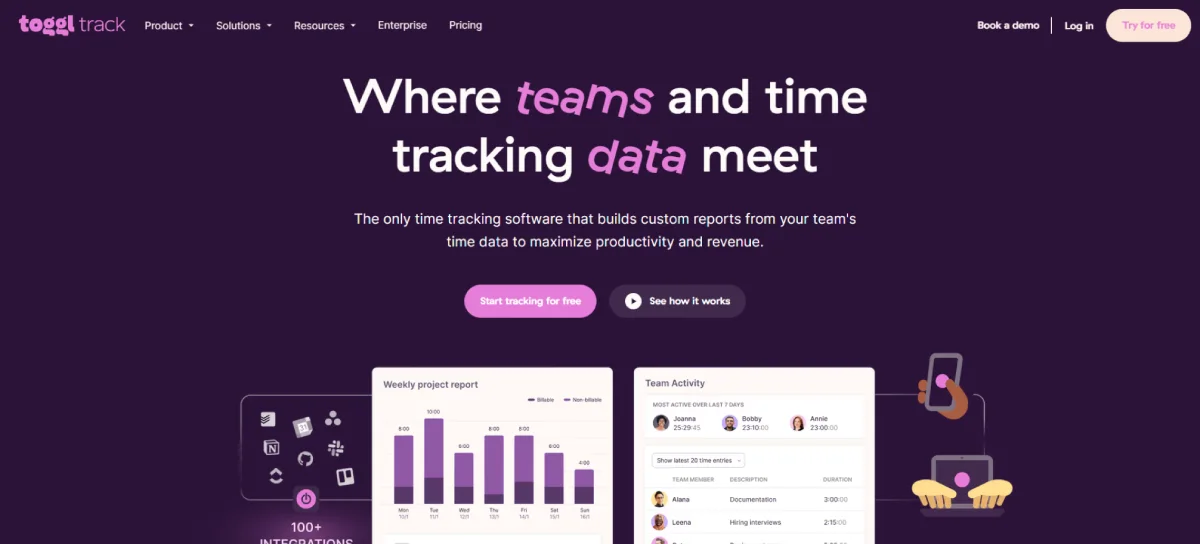
Toggl Track is a clean, user-friendly time tracking tool that focuses on simplicity, flexibility, and team autonomy. It’s perfect for teams who want to track time without feeling monitored, offering powerful reporting, project tracking, and integrations - all without invasive features like screenshots or activity tracking.
Features of Toggle Track
- Time tracking lets you track time manually or with a timer.
- Project and client management organizes time by projects and clients.
- Detailed reporting shows how time is spent with exportable reports.
- Tags and labels help categorize and filter time entries.
- Offline tracking records time without internet and syncs later.
- Team management allows you to invite team members and define billable hourly rates.
- Reminders and auto-tracking prompt time tracking without logging activity.
- Calendar integration connects with Google and Outlook calendars.
Pros & Cons
| Pros | Cons |
|---|---|
| Easy to use with a clean interface | Sync fails between mobile and desktop |
| Cross-platform with 100+ integrations | No automatic time tracking - fully manual |
| Detailed reporting and analytics | Editing entries is time-consuming |
| Free plan available for small teams | Paid plans are pricey for small teams |
Pricing
- Free: $0- free for upto 5 users with limited features.
- Starter: $9/User/Month
- Premium: $18/User/Month
- Enterprise: Custom pricing
Ratings
- G2: 4.6
- Capterra: 4.7
4. Time Doctor
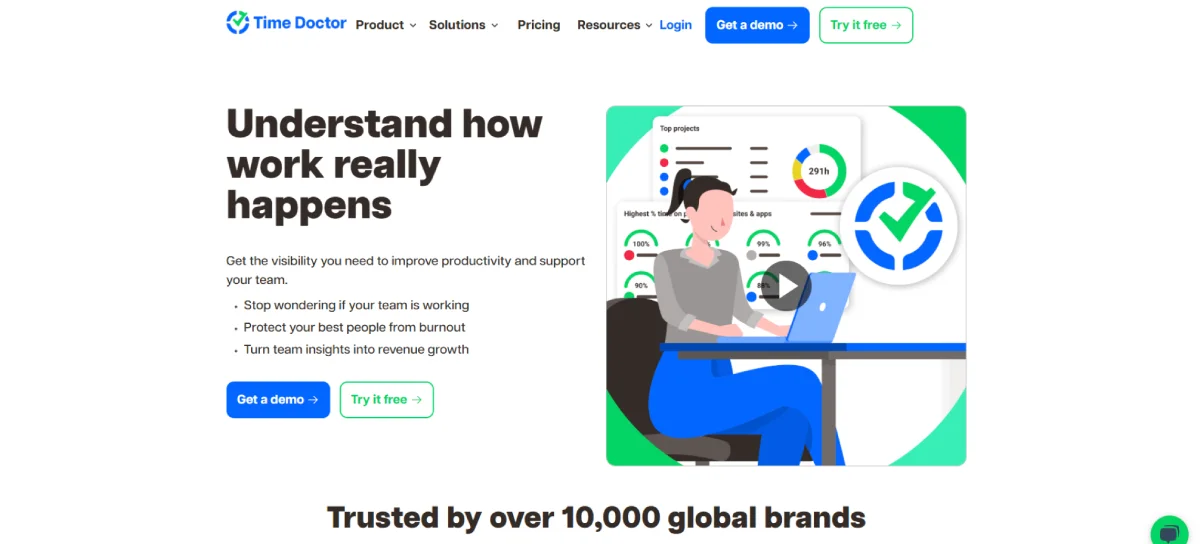
Time Doctor is a feature-rich time tracking and productivity tool designed for businesses like yours that want detailed insights into how teams spend their workday. It combines time tracking, task management, and optional monitoring features, making it a solid choice for teams that need structure, though it may feel too strict for those who prefer a more flexible, privacy-friendly setup.
Features of Time Doctor
- Time tracking logs time automatically or manually.
- App and website tracking monitors tools and sites used during work.
- Screenshots capture screens at set intervals (optional and controlled).
- Offline tracking stores data without internet and syncs later.
- Reports show daily and weekly productivity insights.
- Mobile app enables tracking from phones and tablets.
- Client access lets clients view time reports securely.
- Payroll integration calculates pay based on tracked hours.
Pros & Cons
| Pros | Cons |
|---|---|
| Screenshots and idle time alerts | Frequent bugs, crashes, and sync problems |
| Integrates with many popular tools | Slow customer support |
| Accurate tracking & detailed reports | confusing interface |
| Provides strong productivity insights | Expensive premium plans |
Pricing
- Basic: $6.70/User/Month
- Standard: $11.70/User/Month
- Premium: $16.70/User/Month
- Enterprise: Custom plan
Ratings
- G2: 4.4
- Capterra: 4.5
5. HROne
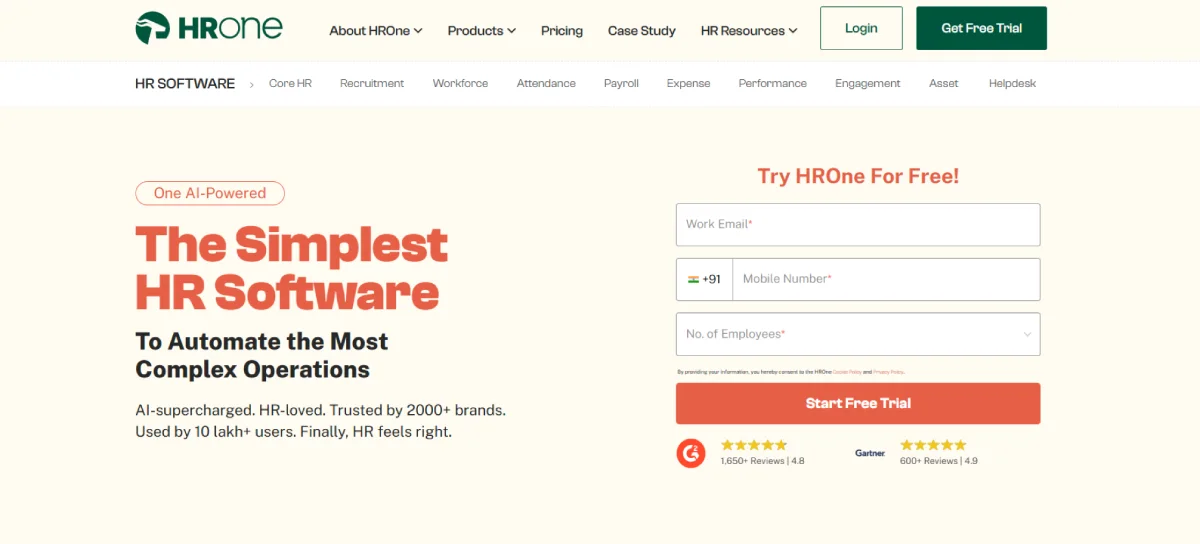
HROne is an all-in-one HR and workforce management platform designed to simplify everything from attendance tracking to payroll. With built-in time tracking, shift scheduling, and leave management, it’s a great option for you if you are looking to replace multiple tools with one easy-to-use system, all without relying on invasive monitoring or AI-driven tracking.
Features of HROne
- Leave management handles leave requests and approvals digitally.
- Shift scheduling assigns and monitors employee shifts.
- Payroll processing automates salary, tax, and pay slip generation.
- Mobile app supports attendance, leave, and time tracking on the go.
- Attendance management tracks clock-in and clock-out times effortlessly.
- Compliance management keeps processes aligned with labor laws.
- Reports and analytics provide insights into workforce data.
- Time tracking logs work hours via web or mobile manually.
Pros & Cons
| Pros | Cons |
|---|---|
| Flexible pricing for different needs | Limited advanced reporting |
| GPS based location tracking | Fewer customization options |
| Easy and user-friendly interface | Occasional performance glitches |
| Automates many HR processes | Onboarding can be difficult for admins |
Pricing
- Basic: $57.57/ for 50 Users/Month
- Professional: $75.59/ for 50 Users/Month
- Enterprise: Custom/ for 50+ team
Ratings
- G2: 4.8
- Capterra: 4.4
6. Clockify
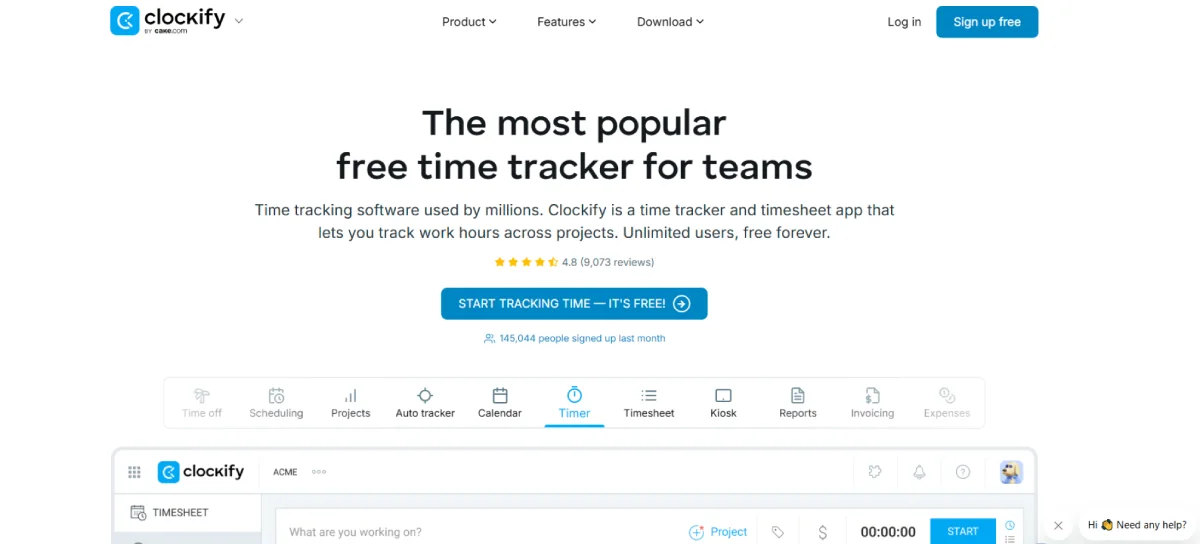
Clockify is a free, easy-to-use time tracking tool built for teams that value simplicity and flexibility. With no intrusive monitoring or AI-based tracking, it’s perfect for businesses that want to track time, manage projects, and boost productivity, without sacrificing trust or team comfort.
Features of Clockify
- Time tracking logs hours manually or with a timer, with no AI or background tracking.
- Project management organizes time entries for projects, tasks, and clients.
- Timesheets let users fill in and submit weekly hours.
- Reports show time data and billable hours without AI-based analysis.
- Billable hours mark entries as billable with custom rates.
- Team management controls user roles, access, and approvals.
- Time off tracking tracks vacations and sick leave manually.
Pros & Cons
| Pros | Cons |
|---|---|
| Free tier with unlimited users/projects | Limited offline functionality |
| User-friendly interface | Mobile app can be slow and glitchy |
| Detailed reporting and analytics | Basic task management features |
| Integrates with over 80 apps | Syncing issues between devices |
Pricing
- Standard: $5.49/User/Month
- Pro: $7.99/User/Month
- Enterprise: $11.99/User/Month
- Productivity suite: $12.99/User/Month
Ratings
- G2: 4.5
- Capterra: 4.8
7. RescueTime
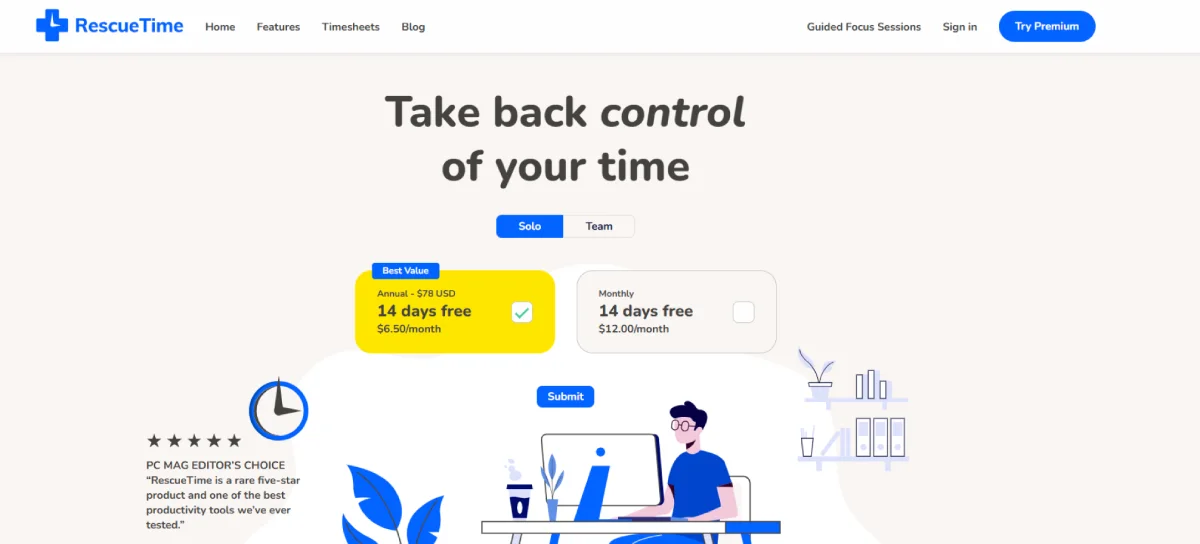
RescueTime is a time management tool designed to help individuals and teams understand how they spend their time and build better work habits. Instead of tracking every click or taking screenshots, RescueTime focuses on improving productivity through goal setting, distraction blocking, and insightful reports.
Features of RescueTime
- Automatic Time tracking logs app and website use without AI.
- Focus sessions to block distractions based on your settings.
- Daily goals track focused work time manually.
- Productivity reports show how your time is used, with no AI scoring.
- Weekly summaries highlight time patterns and focus areas.
- Custom work hours control when tracking is active.
- Offline logging lets you add non-digital work manually.
Pros & Cons
| Pros | Cons |
|---|---|
| Free tier with unlimited users/projects | Limited offline functionality |
| User-friendly interface | Mobile app can be slow and glitchy |
| Detailed reporting and analytics | Basic task management features |
| Integrates with over 80 apps | Syncing issues between devices |
Pricing
- $12.00/User/Month with 14 days Free trial.
Ratings
- G2: 4.2
- Capterra: 4.6
8. Insightful
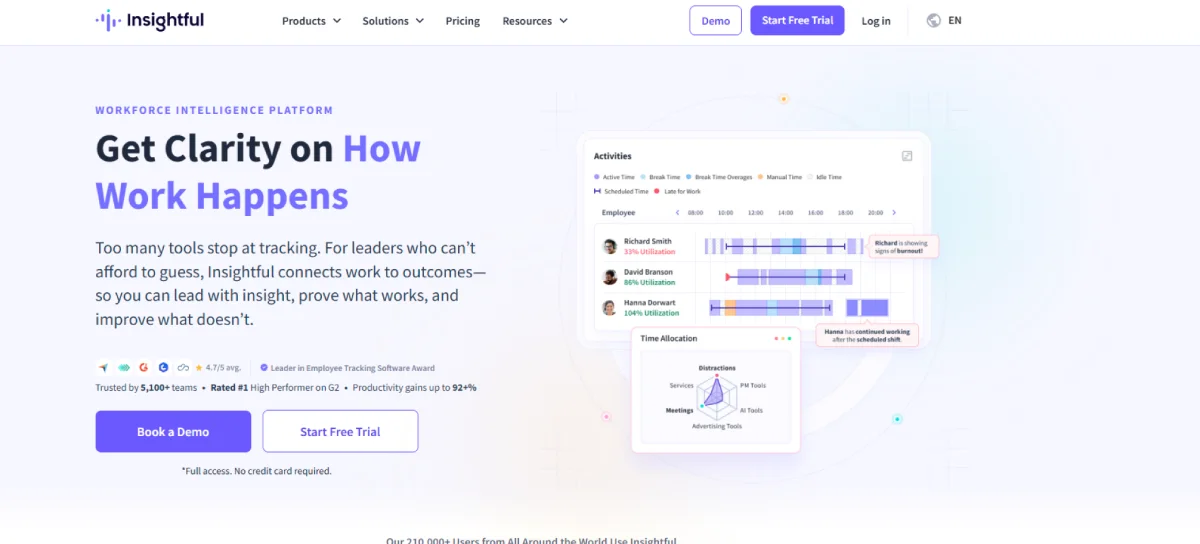
Insightful (Once Workpuls) is a workforce analytics and time tracking tool built for businesses that want to monitor productivity and manage teams efficiently. With features like real-time tracking, app usage monitoring, and attendance management, it’s designed for full visibility, though it may feel too invasive for teams that prioritize privacy and flexibility.
Features of Insightful
- Employee monitoring tracks activity levels and tool usage.
- Real-time insights show live team activity and trends.
- Time tracking automatically logs work hours across apps and websites.
- Automatic time mapping assigns time to projects using preset rules.
- Attendance management tracks logins, breaks, and shift hours.
- Productivity reports summarize time spent on tasks and projects.
- Project management links time entries to specific tasks.
- Manual time entries allow edits or additions to logged time.
Pros & Cons
| Pros | Cons |
|---|---|
| Time & productivity analytics | Sometimes shows wrong or missing data |
| Clean, intuitive dashboard | Slow and clunky interface |
| Automatic screenshots & activity logs | Costs significantly more |
| Detailed budget tracking | No mobile app or GPS tracking |
Pricing
- Productivity Management: $6.40/Seat/Month
- Time Tracking: $8.00/Seat/Month
- Process Improvements: $12.00/Seat/Month
- Enterprise Solution: For teams of 100+/ Custom plan
Ratings
- G2: 4.7
- Capterra: 4.7
9.Apploye
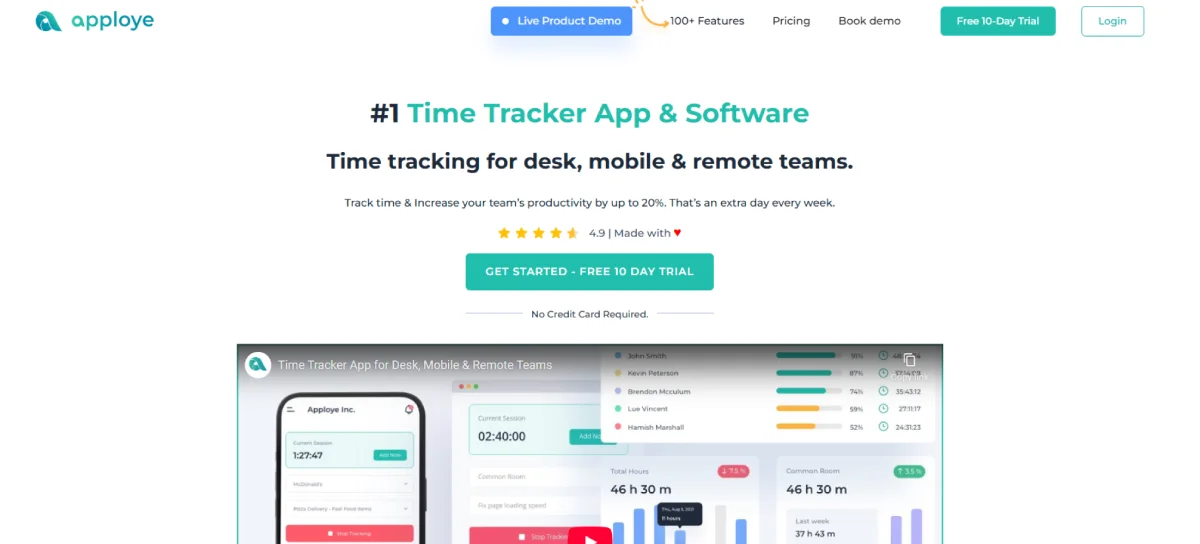
Apploye is a software solution that helps monitor employees and track time, tailored for use by remote and hybrid workforces. It has timesheets, productivity reports, screenshots, and gps tracking, which is why it is the product of choice when it comes to companies that desire visibility and control. It keeps things simple and transparent.
Features of Apploye
- Time tracking lets you track work hours manually or with a timer.
- Timesheets show daily, weekly, and monthly logged hours.
- Productivity reports show how time is allocated across tasks, applications, and websites.
- Screenshots capture screen activity at set intervals.
- GPS tracking tracks employee location during work hours, great for field teams.
- Manual time entry allows users to log or edit time when needed.
- Project and task management help assign tasks and monitor time per project.
Pros & Cons
| Pros | Cons |
|---|---|
| Cross-platform & offline support | Time tracking is manual |
| Pomodoro timer & idle detection | Limited reporting/export options initially |
| Affordable pricing | screenshots and monitoring can feel invasive |
| Task/project management included | Mobile app lacks full functionality |
Pricing
- Standard: $2.50/User/Month
- Elite: $3.50/User/Month
Ratings
- G2: 4.5
- Capterra: 4.8
10. ActivTrak
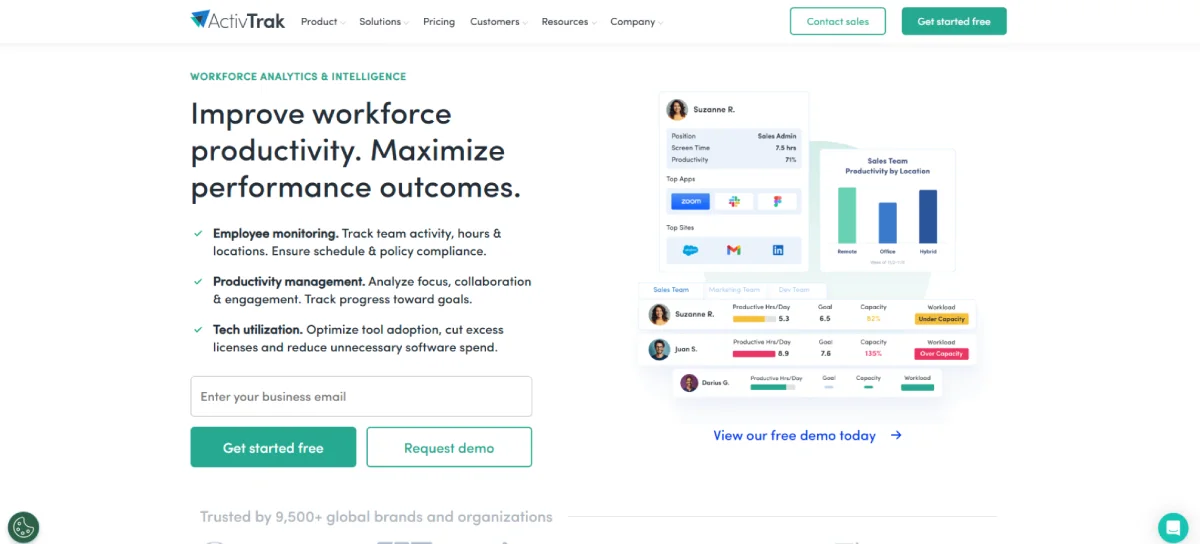
ActivTrak is a workforce analytics and productivity tool that provides you with a clear understanding of work-time usage. It provides activity tracking, usage reports of apps, and productivity summaries to keep teams on track. Although it offers valuable insight, it is best suited for companies that are comfortable with detailed tracking.
Features of ActivTrak
- Activity tracking records how much time is spent using various applications and browsing websites.
- Productivity reports show how work time is used.
- Real-Time monitoring displays live user activity without AI analysis.
- App and website usage lists tools used and duration
- Working hours reports track active hours and breaks.
- Custom reports lets you build insights from chosen data.
- User privacy settings control what’s tracked and who sees it.
- Alarm rules send alerts based on manual conditions.
Pros & Cons
| Pros | Cons |
|---|---|
| Free tier available for up to 3 users | No mobile or tablet monitoring |
| Accurate productivity insights & alerts | Lacks keystroke logging |
| Website/app blocking tools | screenshots and monitoring can feel invasive |
| Supports data exports to BI tools (Power BI, Tableau) | Customer support limited to business hours and often slow |
Pricing
- Free: $0/User/Month
- Essentials: $10/User/Month
- Essential Plus: $15/Use/Month
- Professional: $19/User/Month
Ratings
- G2: 4.4
- Capterra: 4.6
Smart Tips to Choose an Effective Tool for Your Team
When you are choosing a tool for your team, it is very important to know the smart tips to find the perfect one. Here are some of them.
Understand Your Team's Needs
Choose a tool that fits your team’s size, work style, and daily workflows.
Prioritize Ease of Use
The tool should be simple to set up and easy for your employees to use.
Respect Employee Privacy
Avoid tools that are over-monitoring, so look for the tools that are transparent.
Support for Remote & Hybrid Teams
Ensure it works well for in-office, remote, and mobile employees as well.
Focus on Useful Reports
Pick tools that offer clear, actionable reports instead of overwhelming dashboards.
Customizable Tracking Options
Choose software that lets you control what’s tracked and how it’s displayed.
Integration with Existing Tools
Make sure the tool is easily connected with your current project management, payroll, and communication tools.
Scalability for Growth
Look for a solution that can meet your team’s needs.
Fair Pricing and Value
Look for a plan that offers good features with fair prices and free trails.
Conclusion
If DeskTime feels more like surveillance than support, it’s time for you to move on. The top DeskTime alternatives deliver smarter, more flexible time tracking, without micromanaging your team.
No matter whether you are remote, hybrid, or in-office, these tools will allow you to establish trust, improve productivity, and develop a healthier work culture.
Switch to a tool today that truly supports your team, not just tracks them.
Frequently Asked Questions
Yes! Many DeskTime alternatives offer billable hours tracking and support client invoicing. Tools like Time Champ, Clockify, and Toggl Track enable you to assign hourly rates to specific projects or clients and create reports that are easily exported to other apps in different formats.
Absolutely, there are several tools that allow you to track offline and synchronize the information when you are online. Time Champ has the offline time logging feature, where employees can manually enter the offline activities, which is perfect in cases of remote teams operating in low-connectivity locations. Tools like Toggl Track and Apploye also support offline functionality.
Security is a top priority for most modern platforms. Time Champ has strong data protection procedures, such as data encryption, role-based access, and extremely secure cloud storage. Other alternatives like Hubstaff, Insightful, and ActivTrak use GDPR and enterprise-level data security standards to ensure that your team's information stays safe.
Yes, if your goal is to track attendance only, many tools let you customize what features to use. Time Champ helps here, it lets you disable activity tracking and use only attendance features like shift scheduling, login/logout times, and geofencing. This ensures privacy while keeping attendance accurate and automated.
Yes, Time Champ can absolutely replace multiple tools. It combines automatic time tracking, geofencing-based attendance, shift scheduling, project tracking, and even productivity analytics - all in one user-friendly platform. Instead of juggling several tools for time logs, team performance, and attendance, Time Champ simplifies your workflow, saves costs, and promotes transparency without overwhelming your team.
Here are Some Related Articles You may Find Interesting

What is the Average Salary in Bangladesh: Overview & Insights
Discover The Average Salary in Bangladesh and outsourcing impact. Learn why it’s a rising player in global outsourcing.

Average Salary in India: Factors and Comprehensive Comparison
Discover the key factors influencing the average salary in India across industries, regions, and job levels, as well as insights.

What is the Average Salary in Colombia? & Factors Affecting
Discover the average salary in Colombia and explore the key factors affecting earnings, including industries, experience, and location. Find out.

What is the Average Salary in Indonesia?
Discover the average salary in South Africa and explore outsourcing trends. Learn key insights into wages, industries, and business opportunities.

What is the Average Salary in Hong Kong? and It’s Statistics
Learn about the average salary in Hong Kong, from minimum wage to maximum salaries, and gain insights into industry variations.

What is the Average Salary in Singapore: Economic Outlook
Discover the average salary in Singapore, key factors affecting income, insights into the nation’s economic outlook & explore its trends.
